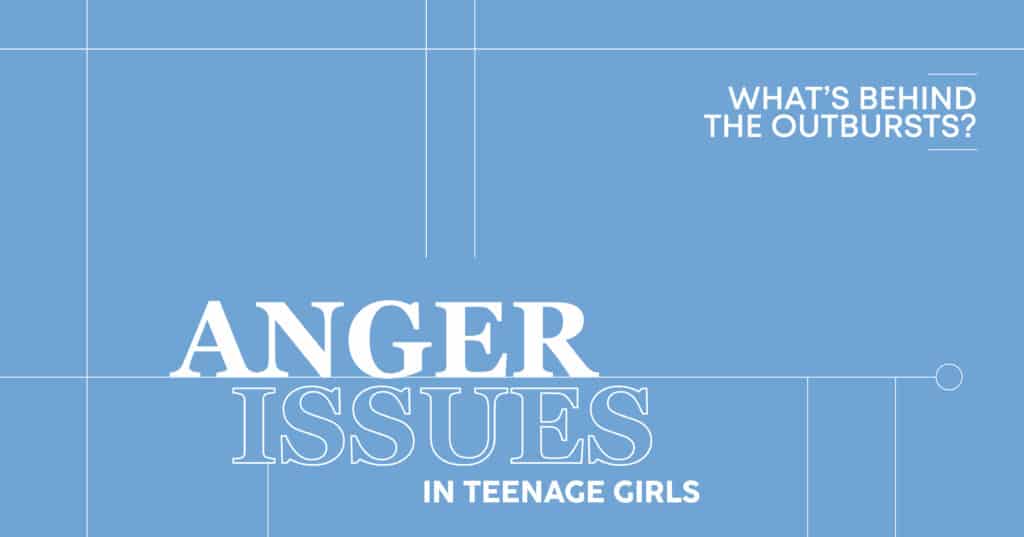Teenage years are tough on both children and parents alike. It’s a time full of self-exploration, sudden changes, and emotional ups and downs that seem to pop up out of nowhere.
And when it comes to teenage girl anger issues, things can get even more complicated. Physical growth, emotional chaos, and academic pressure can all be contributing factors to your child’s unexplained anger.
If you’re trying to figure out how to handle these outbursts with some grace, understanding where it all comes from is step one.
Understanding Anger Issues in Teenage Girls
Feeling angry sometimes is completely normal. It’s part of being human. But when anger gets overwhelming, happens a lot, or seriously messes with daily life, it could mean something deeper is going on. A big part of handling emotions comes from the brain, mainly the prefrontal cortex, which handles planning and decision-making, and the amygdala, which reacts when we feel threatened.
For girls going through their teen years, it’s like a perfect storm. Hormones are raging, social life suddenly feels like life or death, and academics start feeling heavier. And sometimes, it’s not even something happening right now; an old memory or experience can randomly set off anger, too.
Why “Just A Phase” Isn’t Always the Full Story
You might hear “oh, it’s just a phase” a lot. And, yes, sometimes it is. But it’s not always that simple. There’s usually more beneath the surface, causing those teenage anger issues. Some real examples:
- Multiple stressful events. Daily stressors.
- Substance abuse. Peer pressure to try alcohol, weed, vaping, or even misuse prescriptions is real.
- Trauma. Losing a loved one, sexual assault, family divorce, any of these can leave deep scars.
- Mental health struggles. Conditions like ADHD, autism, depression, and anxiety (especially if undiagnosed or untreated) can create extra emotional turmoil. Sometimes, even something bigger, like borderline personality disorder, starts showing signs here.
Dismissing these issues without digging deeper? It can make everything worse. The truth is, your teenage girl might need real help to deal with these big emotions in a healthy way.
Common Causes Behind Teenage Girl Outbursts
Most times, a teenage girl’s anger issues don’t have just one cause. Knowing what’s triggering these explosions can help you be way more effective in supporting your teen.
| Cause | Description |
| Hormonal Changes | Puberty means estrogen and progesterone levels spike, making emotions swing and impulse control weaker. |
| Family Dynamics | Home fights, neglect, or inconsistent rules all ramp up other signs of anger issues in a teenager. |
| Academic Pressure | High stakes at school? Fear of failing? Yeah, frustration builds up fast and boils over. |
| Social Media and Peer Pressure | Online drama, peer comparisons, and feeling left out can seriously hurt self-esteem and cause anger. |
| Trauma or Grief | Past wounds, whether they’re resolved or not, can create anger that doesn’t always have an obvious outlet. |
Some of the physical and emotional signs that your teen’s anger might not be under control include:
- Clenched fists and teeth
- Heart racing
- Tight muscles
- Shaking
- Sweating
- Feeling dizzy
Signs Your Teen May Be Struggling With Anger Issues
Picking up on a teenage girl’s anger issues early can seriously change the game for how you deal with them. Here’s what to keep an eye out for:
- Violent Behavior. Lots of shouting, cursing, and being disrespectful to teachers or parents.
- Physical Aggression. Hitting, throwing stuff around, hurting animals, bullying, if you see any of this, it’s a big red flag.
- Passive Aggressive Behavior. Constant stalling, always blaming others, and “forgetting” to do important tasks just to push buttons.
- Self-harm and Substance Abuse. Cutting, pulling hair, punching walls – all ways to numb painful feelings. Drugs and alcohol also sadly pop up as ways teens try to escape.
- Mood and Behavior Swings. One minute, silent treatment, the next explosive crying fits, or grades dropping out of nowhere.
If any of this sounds familiar, it’s a huge sign to start thinking about better anger management for teens.
How to Handle an Angry Teen Without Escalating the Situation
Here’s something that’s easier said than done: staying calm while your teenager is having a full-on meltdown. Handling an angry teenager starts with you.
When 1000 parents of teens were surveyed, about two-thirds admitted that their kids’ anger scared them sometimes. So yes, you’re not alone. It’s scary. But it’s vital to be the steady hand that guides, not fuels, the fire. Some ways to do that?
- Stay Calm. Your teen’s anger is often the tip of the iceberg. There’s usually something deeper causing it. Staying chill shows them emotional control in real-time, and, honestly, sets a silent expectation for them, too.
- Listen Actively. No eye-rolling, no cutting them off. Actually listen. It helps them feel heard, not judged, which can take the heat out of the moment.
- Set Clear Boundaries. Compassion is key, but so are limits. It’s okay to say “I get why you’re upset, but hurting others or destroying things isn’t acceptable.” Firm but loving.
- Give Them Space. Not everything needs to be solved in the heat of the moment. Sometimes, just stepping away lets cooler heads prevail, yours and theirs.
- Encourage Healthy Expression. Help them brainstorm solutions. Like, “What’s something we could try next time you’re feeling this angry?” Giving them power over their choices builds real emotional muscles.
Anger Management Tools That Actually Work For Teens
Equipping teens with tools to handle their feelings – especially anger – can make a massive difference. Here’s some stuff that really works for anger control for teenagers:
| Tool | Effects |
| Journaling | It gets those bottled-up emotions out safely. Writing it down makes it manageable. |
| Relaxation Techniques | Deep breathing, progressive muscle relaxation. |
| Physical Activity | Exercise is basically emotional reset for angry teens. Perfect for safe venting |
| Mindfulness Apps | Apps that teach meditation and grounding exercises are a teen’s best friend. |
| Creative Outlets | Music, painting, writing poetry – artistic stuff gives anger a non-destructive escape hatch. |
| Communication Training | Practicing assertive but calm talking skills so future conflicts don’t blow up. |
When It Is Time To Seek Professional Help
As much as we want to be the ones who fix everything, sometimes we have to call in backup. Professional help isn’t a failure. It’s an act of love. You’ll know it’s time when:
- Outbursts are frequent, dangerous, or extreme.
- Your teen’s schoolwork is slipping fast and they’re pulling away from friends or family.
- They just can’t seem to deal with frustrations anymore.
- Depression, trauma, or anxiety signs are popping up along with the anger.
It’s not “waiting it out” when things get this serious; it’s “getting the right tools and support in place.”
Your Teen Deserves Support – Hillside Horizon for Teens Is Here To Help
You might still be asking yourself, why is my teenage daughter so angry? And honestly, it’s a tough question with no one-size-fits-all answer. But here’s the thing: you don’t have to figure it all out on your own.
Hillside Horizon for Teens gets it. They offer specialized therapy, personalized counseling sessions, family workshops, and everything you need for real, effective anger management for teens.
Their team actually gets the unique challenges teenage girl anger issues bring. So if you’re feeling lost, they’re a great first call to make.
FAQs
What causes anger issues in teenage girls?
Hormonal swings, academic pressure, mental health struggles, trauma, and family issues are all huge players. Usually, it’s not just one thing.
How can parents help teens manage anger?
By showing calm behavior themselves, setting firm but fair rules, listening without judging, giving teens safe ways to express anger, and getting professional help if needed.
When should I be concerned about my daughter’s anger?
If there’s violence, self-harm, serious mood swings, isolation, or drastic behavior changes, it’s time to step in fast.
Can therapy help with teenage anger issues?
Absolutely – therapy provides safe spaces to unpack emotions and build better coping mechanisms.
How do hormones impact teenage anger?
Hormone changes during puberty (plus the menstrual cycle) heighten emotions and lower impulse control, making it super tough for teens to manage anger sometimes.




